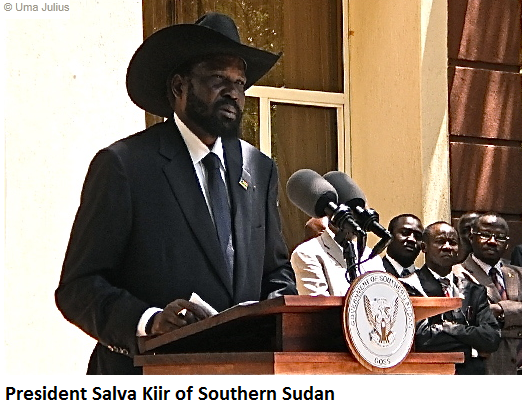 Published: 2 June 2011
Published: 2 June 2011
Country: South Sudan
President Salva Kiir of Southern Sudan said he would not go to war with the north, despite the recent seizure of Abyei by troops of the Khartoum-backed Sudan Armed Forces (SAF). Speaking in public for the first time since northern forces rolled into the disputed, oil-rich region with armoured cars and tanks last weekend, Kiir insisted the south would not strike back.

“We remain committed to peace,” he said. “If anybody thinks the SPLA and the Government of South Sudan are going to retaliate by attacking Abyei or anywhere in Sudan, we are not going to do it.”
President Omar al-Bashir and his army invade other parts of Sudan, he added, the world will be watching.
Reaction to Kiir’s statement has been divided. Some people have called on the southern government to defend Abyei. Many Sudan watchers fear the recent escalation of violence in the border region could lead to another north-south war.
But Kiir told reporters Thursday that the south would rather resolve issues peacefully than resort to armed conflict. The south has fought long enough, he said.
Kiir called on President Bashir to withdraw northern troops from Abyei to allow humanitarian agencies to assist the estimated 20,000 people who were displaced when the SAF moved unilaterally to expel the region’s administrators. Gunmen later looted homes and set the town and surrounding area in flames.
The UN has since said that 150,000 people have fled Abyei, which is inhabited by Ngok Dinka groups loyal to the south and Misseriya Arabs who want the region to be part of the north. The tug-of-war on ownership has intensified ever since a referendum to determine the area’s future status, which was supposed to be held concurrent to the south’s vote on secession in January, was shelved.
The international community, including the United Nations Security Council, has called on SAF troops to pull out of the region.
But President Bashir said northern troops were in Abyei to stay and would not withdraw.
An official of Sudan’s ruling National Congress Party (NCP), said Thursday that SAF troops would not leave the region until a political solution has been reached.
“In order to institute peace, the UN should be neutral,” said Ibrahim Ghandour, an NCP spokesman. “They must look into the facts, which they know very well.”
He was referring to allegations that the SPLA fired upon UN forces while they were escorting SAF troops out of Abyei.
President Kiir said if the SPLA did fire the first shot that sparked the violence, the incident should be investigated.
According to Ghandour, it is a war crime. “But the UN never protested. Now the Security Council is talking about withdrawal,” he said.
Ghandour contends the Sudan People’s Liberation Movement (SPLM) has repeatedly refused all proposals for a “win-win settlement” to resolve the dispute over Abyei.
“They just want to declare Abyei as part of the south,” he said, “which is unacceptable to anybody in the north.”
Kiir faulted Bashir for dissolving the Abyei administration without consulting him as a member of the presidency, a move that violates the provisions of the 2005 peace agreement. He also accused Bashir of falsehoods regarding consultations that Kiir said never took place.
“It is a lie,” Kiir said. “He issued his own decrees dissolving the Abyei administration.”
The Southern Sudanese president called on both the SAF and the Messiriya Arab tribesmen, who eyewitnesses say are now in Abyei town, to stop inciting war.
Kiir urged those displaced by the fighting to keep hope alive while his government seeks a peaceful solution to the crisis.
“The people of Abyei should not despair,” he said. “Abyei is their land and they will go back to Abyei. Whatever it costs us, Abyei will remain the land of the nine Ngok Dinka chiefdoms. It is already resolved and it is in the documents.”
To some observers, the dispute is not an isolated incident but part of a wider effort to undermine Southern Sudan’s independence, which takes effect on 9 July.
 Badru Mulumba, a specialist on Sudanese affairs, points to a series of measures by the NCP that comprise “a three-pronged strategy” against the south, which is “tantamount to a declaration of war.”
Badru Mulumba, a specialist on Sudanese affairs, points to a series of measures by the NCP that comprise “a three-pronged strategy” against the south, which is “tantamount to a declaration of war.”
One of these moves is the closure of trade routes between north and south, which have led to a severe food shortage in many areas of southern Sudan.
The road closures, the occupation of Abyei, and militia attacks allegedly backed by Khartoum “are all linked”, said Mulumba.
The NCP must choose whether it will have a friendly relationship with the south or continue to create an atmosphere of outright enmity, Mulumba said. The international community will have to intervene to resolve the impasse, he added.
Martin Ladu Tombe, a resident of Juba, said he believed Abyei belonged to the South, but saw no easy answer to the question of ownership.
“It is really difficult,” he said, adding that leaders should perhaps divide Abyei “fifty-fifty” if no other solution can be found.
“Then we move on with life,” Tombe said. “We are really tired of war.”
Courtesy of Sudanvotes.com